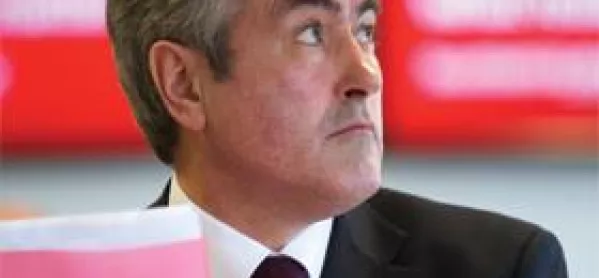`Increasing teacher numbers is hard to imagine’

Scottish Labour’s new education spokesman has vowed to improve the life chances of pupils in the poorest parts of Scotland, but admitted that teacher numbers were not likely to increase should his party win power.
In his first interview with TESS since his appointment in December, Iain Gray said he wanted to target about 20 secondary schools and their associated primaries where “disadvantage has been most extreme”.
The party was exploring ideas for “pretty significant intervention” in these schools if it won the 2016 Holyrood election, Mr Gray said.
New Scottish Labour leader Jim Murphy has previously suggested doubling the number of classroom assistants in these primary schools, along with the introduction of a scheme similar to the former chartered teacher system, which attempted to keep talented teachers in the classroom until it was scrapped in 2012.
“I don’t think Jim is saying we would bring the scheme back in exactly as it was, but [it would] help us support intervention at the sharp end of the achievement gap,” Mr Gray said.
He admitted, however, that no big rise in teacher numbers was on the cards. The overall number of teachers in Scotland has fallen by about 4,000 since 2007 and the pupil-teacher ratio has risen from 13 to 13.6 to 1 in the same period. Classroom unions have expressed concern that an agreement by local authorities and the Scottish government to prevent class sizes rising even further may not be extended beyond this year.
Those concerns appeared to ease this week when finance secretary John Swinney offered councils an extra pound;10 million to protect teacher numbers. Before that announcement, Mr Gray argued that the government’s move towards an “outcomes-based” approach, as advocated by Mr Swinney, amounted to little more than “code for abandoning the promises he made on teacher numbers and class sizes”.
But he added: “I’m simply being honest: I think the chances of us reinstating 4,500 teachers on teaching courses, that’s difficult to imagine in practical and budgetary terms.”
Mr Gray, a former physics teacher who in recent weeks has been highlighting extreme budgetary pressures on school science, said that Labour had “no intention” of removing universal free school meals for P1-3s, despite appearing to criticise the policy in recent weeks for benefiting wealthy families. The scheme won widespread support from trade unions and children’s charities when it was introduced by the Scottish government last month.
“I didn’t oppose the scheme,” Mr Gray said. “I made very clear at the time that we think free school meals [are] in principle a good thing.” He added that the money “would have been better used to extend childcare”.
In the preschool sector, Mr Gray called for an end to the current debate about “who can offer the most free hours”, a reference to the Scottish government’s extension of free education for three- and four-year-olds from 475 to 600 hours per year. Mr Gray said that Labour would prefer to focus on the “affordability, flexibility and quality” of provision.
“I’m not saying we would pull back from the expansion of free preschool education,” he added, “but it’s about reframing the debate.” Labour is keen to ensure that childcare does not cost more than 10 per cent of the country’s median income.
Mr Gray, who was Scottish Labour leader between 2008 and 2011, also said that he intended to raise the profile of further education. He added that the sector had in recent years become “the whipping boy of the education system”, with colleges, schools and universities operating in “separate worlds” in terms of funding.
Labour has called for colleges to operate at the forefront of local “hubs”, working with schools and universities to improve areas such as vocational education and making it easier for students to move between sectors.
The party has no plans, however, to undo the controversial recent regionalisation of further education. “We will work with that new reality,” Mr Gray said. “In fact, we will make [it] a positive opportunity. For example, given the opportunity, we would get rid of Skills Development Scotland, break its functions down to a local level and make that.part of a proper, holistic local strategy of educational opportunity.”
Keep reading for just £1 per month
You've reached your limit of free articles this month. Subscribe for £1 per month for three months and get:
- Unlimited access to all Tes magazine content
- Exclusive subscriber-only stories
- Award-winning email newsletters



